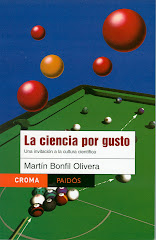Published in Milenio Diario, July 1st, 2009
 According to Wikipedia, it was Dutch cartoonist Robert Storm Petersen who said: "making predictions is hard… especially about the future."
According to Wikipedia, it was Dutch cartoonist Robert Storm Petersen who said: "making predictions is hard… especially about the future."
True, but those who can predict the future with some reliability have better chances of surviving.
Predictions can vary from the complex phenomenon of learning —what to do to obtain certain results— up to the conditioned responses discovered by Ivan Pavlov in the XIX century, which explains how dogs can "learn" to secrete saliva to the sound of a bell, even when there's no food near.
But to learn that when the sky gets cloudy I need to find cover, or to hate any food that has sometime made me sick, I need a nervous system.
Species that lack this system have to resign to "learn" more slowly, through natural selection: the environment eliminates individuals that react in the wrong way, and maintains the ones that get it right. Unfortunately, this form of "prediction" is not flexible, and big environmental changes exterminate a large part of the population, which are incapable of adapting quickly.
Amazingly, scientists of the Weizmann Institute of Israel have just published (Nature, June 17) that some microbes, such as intestinal bacteria Escherichia coli and brewing yeast Saccharomyces cerevisiae can "predict" changes that have not yet occurred in their environment, and activate in advance the genes they are going to need.
They achieve this through evolution: through natural selection, as experimentally confirmed, such microbes "learn", as a species, to associate environment stimuli with gene activation.
Of course, the trick only works in environments that present regular changes (such as the ones the bacteria encounter when passing through the various zones of our digestive tract, or the ones that the yeast causes when changing the temperature of its environment as they ferment the available sugars).
Even so, the lesson is clear: even brainless microbes can learn to predict, thanks to evolution.
(translated by Adrián Robles Benavides) To receive Science for pleasure weekly
in your email, subscribe here!




No comments:
Post a Comment